#virtual haven
Text


#artwork#digital art#my art#object shows#osc#object show oc#object oc#object art#osc art#object show community#object show art#virtual haven
39 notes
·
View notes
Text

Virtual Haven - Software Paradise (2018)
54 notes
·
View notes
Text
🌟 Welcome to our vibrant corner of the digital universe! 🌍💕

Hey there, lovely souls! We are beyond excited to open our arms (and screens!) to you in this wonderful space where togetherness knows no bounds. Whether you stumbled upon us by chance or intentionally sought out a community that celebrates unity, you're in the right place.
In a world that's both vast and connected, we've embarked on a journey to highlight the magic that happens when hearts align, even across the miles that separate us. Here, we're all about embracing the beauty of technology's ability to weave bonds that are just as strong as those formed face-to-face.
Picture this: a place where friendships are nurtured through heartfelt comments, where stories are exchanged with the tap of a keyboard, and where smiles are shared via emoji waves. We believe in the power of the digital realm to create connections that matter, connections that remind us that we're part of something bigger—a global tapestry of kindred spirits.
Our virtual haven isn't just a blog—it's a hub of love, positivity, and camaraderie. It's where you can find your daily dose of inspiration, whether it's a motivational quote, a heartwarming story, or a virtual hug that reaches you wherever you are.
So, as you embark on this journey with us, remember that you're not alone. You're now part of a community that thrives on the joy of being together, even if it's through the glow of a screen. Your voice matters here, and your presence lights up our digital family.
Join us as we celebrate the art of forging connections in this beautifully chaotic world. Let's sprinkle a little more kindness, share a few more smiles, and remind each other that no matter where we are, we're in this together.
Stay tuned for more heartwarming tales, thought-provoking discussions, and virtual adventures. Let's paint the pixels of our screens with the colors of friendship and unity!
With digital hugs and warm welcomes, Merah
#TogetherWeThrive #VirtualConnections #EmbraceTheOnline
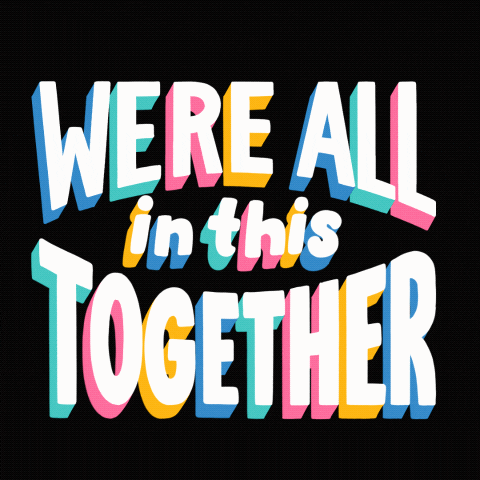
#welcome to the community#digital unity#bridging hearts#virtual haven#together through screens#spread positivity#connected souls#online family#embrace the journey#global connections#find your tribe#digital camaraderie#thrive together#virtual warmth#share the joy#inspire connect create#heartfelt connections#screen to soul#kindred spirits#navigating the digital#embrace the distance
1 note
·
View note
Text

Yeehawgust - Day 3 - Break Away From The Herd
(repost, forgot the Yeehawgust tag)

#Yeehawgust#Yeehawgust Prompts#Yeehawgust 2024#rdr2#red dead redemption 2#red dead redemption two#dutch van der linde#rdr2 dutch#dutch rdr2#van der linde gang#Lemoyne#Hill Haven Ranch#rdr2 photography#red dead redemption 2 photography#virtual photography#cowboys#old west#rdr2 community#red dead redemption 2 community
8 notes
·
View notes
Text
Windswept Scarlet Sands & Rainy Apartments Tour
1/31/23 - 2/1/23
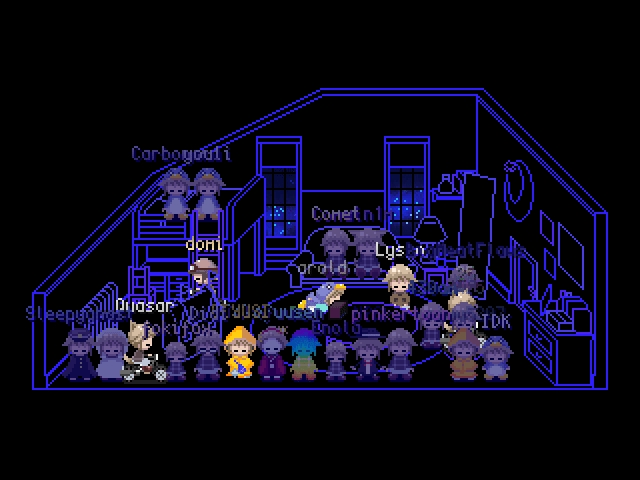


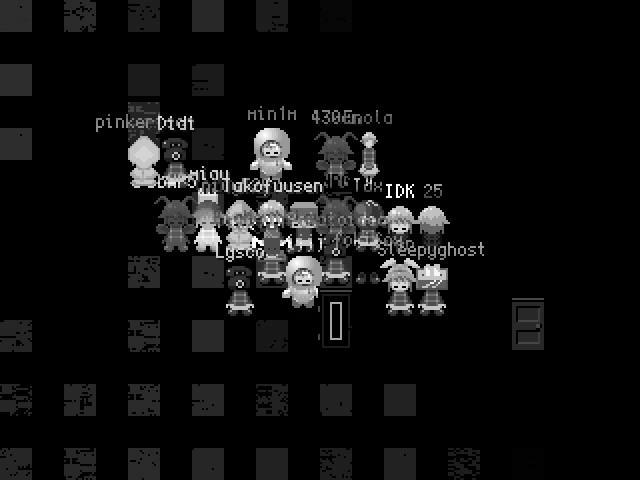


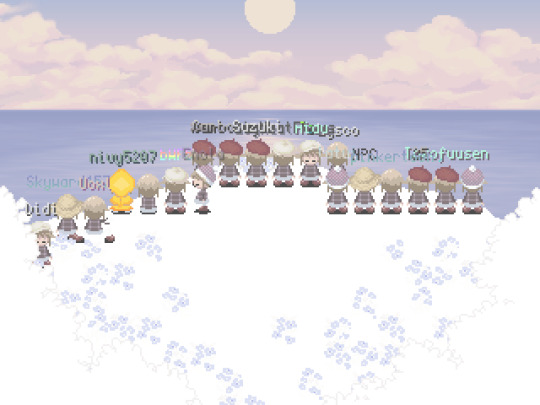





#yno#ynoproject#yno tour#yume 2kki#ynfg#qxy#adabana gardens#techno condominium#static labyrinth#reflecting electron zone#cotton candy haven#virtual city#rainy apartments
80 notes
·
View notes
Text

13 notes
·
View notes
Text




📷 Angoris Lakefront, Decratom Highlands, Southwest Niflheim
#final fantasy xv#prompto argentum#ffxv#final fantasy 15#ff15#episode prompto#final fantasy#ff#virtual photography#vp#dayasanxv#on account of none of these areas having ingame names#im naming the lake after the kaiser behemoth sidequest 'King Of The Angoris'#and the mountains / snow plains after Decratom Haven
10 notes
·
View notes
Text

You were stupid to come back here
(original game photography from The Last of Us Part II by @westonspharmacyphotodept -- all manual post-production using no presets, stock, templates or AI).
#the last of us#the last of us part 2#haven#seraphites#seraphite island#seattle#game photography#brute#virtual photography#photo mode
2 notes
·
View notes
Note
Alright so I’m a big fan of crafting systems in games, so I was wondering what your opinion on dynamic crafting systems was. Like systems where recipes have variance depending on how you complete them.
(The hot cake will have to be in DMs😘)
I am generally a fan, however I do find that the system hast to be clear to be fun.
Main game, I have seen a system like this is Tinkers Construct. This mod allows you to me highly customizable tool. Each part is made of different material, and with some maths this gives the tool its stats. On top of that, you have like resource management fun of making something good with materials on hand.
The mod has specially fun mid-game because that where you have to balance cost and effects. Similarly, I am not the biggest fan of how stack one moider to hell and back. Like it's great for powerful/silly tool and weapons, but it's also a big resource sink without offering any choices.
This reminded of something I have been thinking... I wanted to try making a terraria like game with a system. Actually, block placing/breaking might not even be necessary, just terrain combat. I would also like to focus more on qualitative rather than quotative differences. I want to craft a sword that "this sword has a speed buff as on hit effect, so I can doge better" rather than "it does more damage"
Another version of dynamic crafting system I have seen, in game I don't remember a game of, was 'quality based', where better material had higher chance of making an improved version of tool and weapons. That one was cool and a solid system, but not the reason to play that game.
Also, then there is a game like Haven that doesn't have a dynamic system, but you can cook a meal of out of any two ingredients, but outcomes are custom-made. Each ingredient has a focus area, but it is best to combine two different ones. The game encouraged experimentation, so it was really nice to finding powerful combinations and completing a cookbook. Also, I had fun figuring how to turn my set of ingredients into the best possible set of meals.
Then there is freedom madness in from Rick and Morty: Virtual Rick-ality, but I haven't played it (I don't even own a VR headset. room space or hardware to run VR), so I think it's hard to say much about it what developers haven't said in a GDC. However, mad respect if include a system like that in your game.
so yeah... those are cool system. They can be done poorly, but when done right, they are:

#video games#game dev#game design#minecraft#rick and morty#ick and Morty: Virtual Rick-ality#Tinkers Construct#haven#terraria
15 notes
·
View notes
Text


#dragon age#dragon age: inquisition#dragon age inquisition#da#da:i#dai#virtual photography#haven#i started playing something new and it's really pretty and i am#happy sigh#jg
9 notes
·
View notes
Text
The 2nd Vtuber of The Day is Ginrei Shinoa, from the Japanese agency, Happy Hunters Haven's (or HHH) first wave! She is a witch! She streams on Twitch and youtube in Japanese!


#hhh#vtuber#vtubers#vtubing#virtual youtuber#virtual youtubing#japanese vtubers#japanese vtuber#vtuber jp#jpvtuber#jp vtuber#happy hunters haven#ginrei shinoa
6 notes
·
View notes
Text

Yeehawgust - Day 3 - Break Away From The Herd

#rdr2#red dead redemption 2#red dead#red dead redemption two#rockstar games#video games#dutch van der linde#rdr2 dutch#dutch rdr2#van der linde gang#Hill Haven Ranch#Lemoyne#rdr2 photography#red dead redemption 2 photography#virtual photography#cowboys#old west#rdr2 community#red dead redemption 2 community#red dad redemption
7 notes
·
View notes
Text

Announcing Art Haven Weekly Virtual Retreat! JenniferShao.com
Introducing Art Haven Weekly Virtual Retreats! Join us every Wednesday from 6 PM to 7 PM Eastern Standard Time for an immersive artistic experience like no other. Immerse yourself in an hour of creative exploration, self-expression, and community connection, all from the comfort of your own home or art studio. Whether you're a seasoned artist or just beginning your creative journey, Art Haven welcomes you with open arms. Mark your calendars and get ready to unleash your creativity with us. See you at Art Haven!
Registration: JenniferShao.com
Read more: https://jennifershao.com/blogs/news/announcing-art-haven-weekly-virtual-retreat-1
0 notes
Text


2 notes
·
View notes
Text
just fucking died
#talking#thought i wasnt. gonna cover my coworker's shift saturday like i offered her since one of the managers said no (its in a department i haven#been trained in) but another manager called me and was like we can put u on the register like normal. alright yeah i'll do that i guess#and then for some reason i said yes to working 10-4 on sunday instead of 10-2. FUCKKKKKKKKK#like man yeah alright. i'll do that. guess i gotta bust my fuckin ass on assignments on friday now tho since i'll have virtually no weekend#whatever. counting thursday thats just 3 days all week like theyve always been giving me. i was just looking forward to a little more free#time with the 2 days i was Gonna have this week LOL#(chanting like a mantra) at least im getting paid at least im getting paid at least im getting p
0 notes
Text
The one weird monopoly trick that gave us Walmart and Amazon and killed Main Street
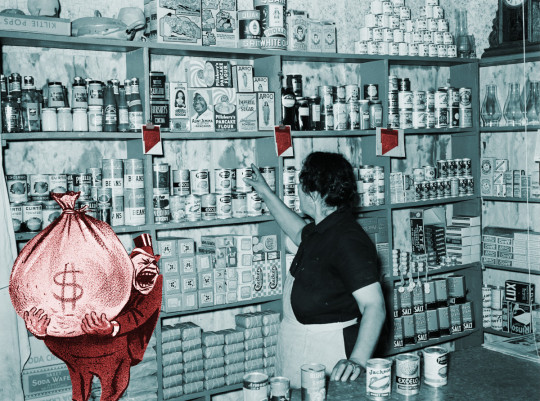
I'm coming to BURNING MAN! On TUESDAY (Aug 27) at 1PM, I'm giving a talk called "DISENSHITTIFY OR DIE!" at PALENQUE NORTE (7&E). On WEDNESDAY (Aug 28) at NOON, I'm doing a "Talking Caterpillar" Q&A at LIMINAL LABS (830&C).

Walmart didn't just happen. The rise of Walmart – and Amazon, its online successor – was the result of a specific policy choice, the decision by the Reagan administration not to enforce a key antitrust law. Walmart may have been founded by Sam Walton, but its success (and the demise of the American Main Street) are down to Reaganomics.
The law that Reagan neutered? The Robinson-Patman Act, a very boring-sounding law that makes it illegal for powerful companies (like Walmart) to demand preferential pricing from their suppliers (farmers, packaged goods makers, meat producers, etc). The idea here is straightforward. A company like Walmart is a powerful buyer (a "monopsonist" – compare with "monopolist," a powerful seller). That means that they can demand deep discounts from suppliers. Smaller stores – the mom and pop store on your Main Street – don't have the clout to demand those discounts. Worse, because those buyers are weak, the sellers – packaged goods companies, agribusiness cartels, Big Meat – can actually charge them more to make up for the losses they're taking in selling below cost to Walmart.
Reagan ordered his antitrust cops to stop enforcing Robinson-Patman, which was a huge giveaway to big business. Of course, that's not how Reagan framed it: He called Robinson-Patman a declaration of "war on low prices," because it prevented big companies from using their buying power to squeeze huge discounts. Reagan's court sorcerers/economists asserted that if Walmart could get goods at lower prices, they would sell goods at lower prices.
Which was true…up to a point. Because preferential discounting (offering better discounts to bigger customers) creates a structural advantage over smaller businesses, it meant that big box stores would eventually eliminate virtually all of their smaller competitors. That's exactly what happened: downtowns withered, suburban big boxes grew. Spending that would have formerly stayed in the community was whisked away to corporate headquarters. These corporate HQs were inevitably located in "onshore-offshore" tax haven states, meaning they were barely taxed at the state level. That left plenty of money in these big companies' coffers to spend on funny accountants who'd help them avoid federal taxes, too. That's another structural advantage the big box stores had over the mom-and-pops: not only did they get their inventory at below-cost discounts, they didn't have to pay tax on the profits, either.
MBA programs actually teach this as a strategy to pursue: they usually refer to Amazon's "flywheel" where lower prices bring in more customers which allows them to demand even lower prices:
https://www.youtube.com/watch?v=BaSwWYemLek
You might have heard about rural and inner-city "food deserts," where all the independent grocery stores have shuttered, leaving behind nothing but dollar stores? These are the direct product of the decision not to enforce Robinson-Patman. Dollar stores target working class neighborhoods with functional, beloved local grocers. They open multiple dollar stores nearby (nearly all the dollar stores you see are owned by one of two conglomerates, no matter what the sign over the door says). They price goods below cost and pay for high levels of staffing, draining business off the community grocery store until it collapses. Then, all the dollar stores except one close and the remaining store fires most of its staff (working at a dollar store is incredibly dangerous, thanks to low staffing levels that make them easy targets for armed robbers). Then, they jack up prices, selling goods in "cheater" sizes that are smaller than the normal retail packaging, and which are only made available to large dollar store conglomerates:
https://pluralistic.net/2023/03/27/walmarts-jackals/#cheater-sizes
Writing in The American Prospect, Max M Miller and Bryce Tuttle1 – a current and a former staffer for FTC Commissioner Alvaro Bedoya – write about the long shadow cast by Reagan's decision to put Robinson-Patman in mothballs:
https://prospect.org/economy/2024-08-13-stopping-excessive-market-power-monopoly/
They tell the story of Robinson-Patman's origins in 1936, when A&P was using preferential discounts to destroy the independent grocery sector and endanger the American food system. A&P didn't just demand preferential discounts from its suppliers; it also charged them a fortune to be displayed on its shelves, an early version of Amazon's $38b/year payola system:
https://pluralistic.net/2022/11/28/enshittification/#relentless-payola
They point out that Robinson-Patman didn't really need to be enacted; America already had an antitrust law that banned this conduct: section 2 of the the Clayton Act, which was passed in 1914. But for decades, the US courts refused to interpret the Clayton Act according to its plain meaning, with judges tying themselves in knots to insist that the law couldn't possibly mean what it said. Robinson-Patman was one of a series of antitrust laws that Congress passed in a bid to explain in words so small even federal judges could understand them that the purpose of American antitrust law was to keep corporations weak:
https://pluralistic.net/2023/04/14/aiming-at-dollars/#not-men
Both the Clayton Act and Robinson-Patman reject the argument that it's OK to let monopolies form and come to dominate critical sectors of the American economy based on the theoretical possibility that this will lead to lower prices. They reject this idea first as a legal matter. We don't let giant corporations victimize small businesses and their suppliers just because that might help someone else.
Beyond this, there's the realpolitik of monopoly. Yes, companies could pass lower costs on to customers, but will they? Look at Amazon: the company takes $0.45-$0.51 out of every dollar that its sellers earn, and requires them to offer their lowest price on Amazon. No one has a 45-51% margin, so every seller jacks up their prices on Amazon, but you don't notice it, because Amazon forces them to jack up prices everywhere else:
https://pluralistic.net/2024/03/01/managerial-discretion/#junk-fees
The Robinson-Patman Act did important work, and its absence led to many of the horribles we're living through today. This week on his Peoples & Things podcast, Lee Vinsel talked with Benjamin Waterhouse about his new book, One Day I’ll Work for Myself: The Dream and Delusion That Conquered America:
https://athenaeum.vt.domains/peoplesandthings/2024/08/12/78-benjamin-c-waterhouse-on-one-day-ill-work-for-myself-the-dream-and-delusion-that-conquered-america/
Towards the end of the discussion, Vinsel and Waterhouse turn to Robinson-Patman, its author, Wright Patman, and the politics of small business in America. They point out – correctly – that Wright Patman was something of a creep, a "Dixiecrat" (southern Democrat) who was either an ideological segregationist or someone who didn't mind supporting segregation irrespective of his beliefs.
That's a valid critique of Wright Patman, but it's got little bearing on the substance and history of the law that bears his name, the Robinson-Patman Act. Vinsel and Waterhouse get into that as well, and while they made some good points that I wholeheartedly agreed with, I fiercely disagree with the conclusion they drew from these points.
Vinsel and Waterhouse point out (again, correctly) that small businesses have a long history of supporting reactionary causes and attacking workers' rights – associations of small businesses, small women-owned business, and small minority-owned businesses were all in on opposition to minimum wages and other key labor causes.
But while this is all true, that doesn't make Robinson-Patman a reactionary law, or bad for workers. The point of protecting small businesses from the predatory practices of large firms is to maintain an American economy where business can't trump workers or government. Large companies are literally ungovernable: they have gigantic war-chests they can spend lobbying governments and corrupting the political process, and concentrated sectors find it comparatively easy to come together to decide on a single lobbying position and then make it reality.
As Vinsel and Waterhouse discuss, US big business has traditionally hated small business. They recount a notorious and telling anaecdote about the editor of the Chamber of Commerce magazine asking his boss if he could include coverage of small businesses, given the many small business owners who belonged to the Chamber, only to be told, "Over my dead body." Why did – why does – big business hate small business so much? Because small businesses wreck the game. If they are included in hearings, notices of inquiry, or just given a vote on what the Chamber of Commerce will lobby for with their membership dollars, they will ask for things that break with the big business lobbying consensus.
That's why we should like small business. Not because small business owners are incapable of being petty tyrants, but because whatever else, they will be petty. They won't be able to hire million-dollar-a-month union-busting law-firms, they won't be able to bribe Congress to pass favorable laws, they can't capture their regulators with juicy offers of sweet jobs after their government service ends.
Vinsel and Waterhouse point out that many large firms emerged during the era in which Robinson-Patman was in force, but that misunderstands the purpose of Robinson-Patman: it wasn't designed to prevent any large businesses from emerging. There are some capital-intensive sectors (say, chip fabrication) where the minimum size for doing anything is pretty damned big.
As Miller and Tuttle write:
The goal of RPA was not to create a permanent Jeffersonian agrarian republic of exclusively small businesses. It was to preserve a diverse economy of big and small businesses. Congress recognized that the needs of communities and people—whether in their role as consumers, business owners, or workers—are varied and diverse. A handful of large chains would never be able to meet all those needs in every community, especially if they are granted pricing power.
The fight against monopoly is only secondarily a fight between small businesses and giant ones. It's foundationally a fight about whether corporations should have so much power that they are too big to fail, too big to jail, and too big to care.

Community voting for SXSW is live! If you wanna hear RIDA QADRI and me talk about how GIG WORKERS can DISENSHITTIFY their jobs with INTEROPERABILITY, VOTE FOR THIS ONE!

If you'd like an essay-formatted version of this post to read or share, here's a link to it on pluralistic.net, my surveillance-free, ad-free, tracker-free blog:
https://pluralistic.net/2024/08/14/the-price-is-wright/#enforcement-priorities
#pluralistic#Robinson-Patman Act#ftc#alvaro bedoya#monopoly#monopsony#main street#too big to jail#too big to care#impunity#regulatory capture#prices#the american prospect#Max M Miller#Bryce Tuttle#a and p#wright patman
2K notes
·
View notes